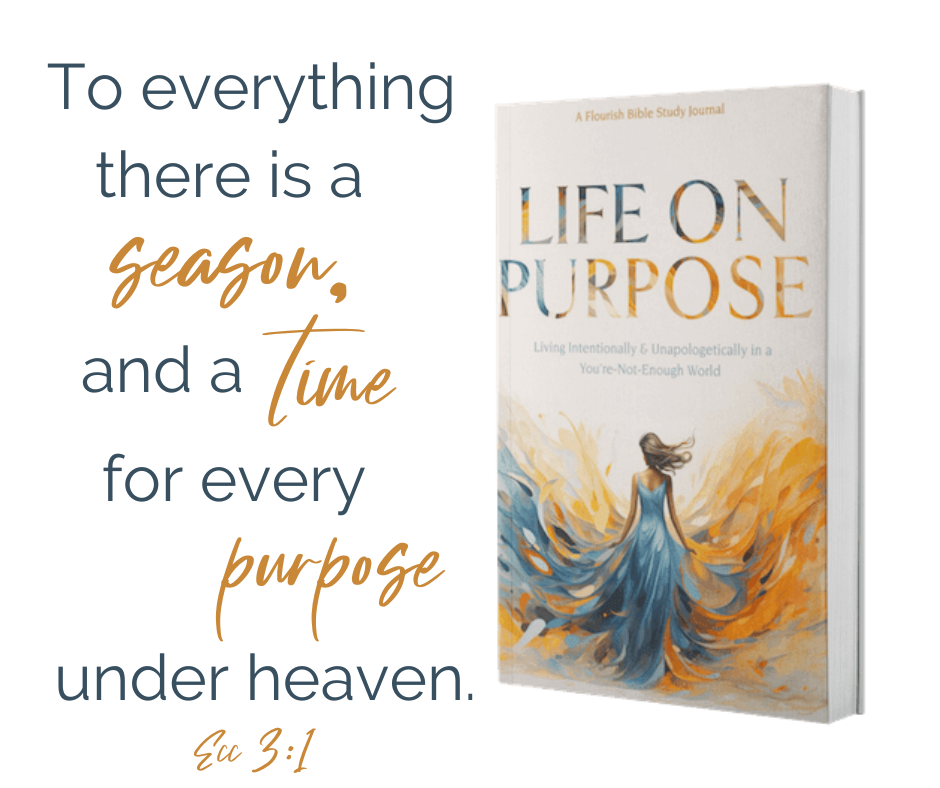On the day of my first child’s dedication, we sang the opening verses of Isaiah 55, a song rich with harmony composed by our friends. They had dedicated their first child six months earlier, and so after years of friendship and making music together, the four of us launched out into the uncertain waters of parenthood.
With the promises of Isaiah ringing in our ears, we embarked on the journey—parents who had dedicated our children to God, full of anticipation and hope for the future. Except there was the present to deal with. Even if you’re not a parent, you’ve likely been involved with young families as an aunt, godmother, or Sunday school teacher, so you’ve observed that bringing home a new baby is a potent mixture of joy and stress.
The fledgling journey on earth is not without drama. When a new baby takes up residence in your home, your altered reality includes sleepless nights, colicky wails, teething pain, plus gallons of drool and other bodily fluids. Fortunately, you’re too besotted with the infant to notice that your visions of unbridled joy are going to be delayed. This is hard work.
Maybe rewards will come when the child is a little older and proves more capable. Well, goodness, before too long they indeed become more capable. Their skill set grows to include pitching fits, throwing food, biting friends, and shrieking “No!” at the top of their little lungs. In those early days, it’s hard to believe the maxim “small kids—small problems; big kids—big problems.” When you’re parenting young’uns for the first time, it seems impossible that it could get much harder. Are you ready to be surprised?
It gets harder.
Singing Isaiah 55 was a good place to start, but little did we anticipate the tangled paths family life would reveal. The adolescent years brought mental health challenges, some explosively visible, others darkly hidden. When you fear losing your child, you cast your thoughts back to that dedication so long ago when you declared that the child belonged to God.
When it looks like the joyous future is not panning out, it challenges the foundation of ownership. Does the child belong to me or to God? Maybe it’s a little bit of both, but then whose responsibility is it to fix this situation? Is it even something that a parent has the power to fix? The youngster is growing into an autonomous human being, and we have no guarantees about what the future holds. This is the crushing that generously invites us to a place of surrender.
I raise my hands in supplication. I’m also a child. I’m God’s child. God was delighted on the day I was born. He knew my journey would not be without peril, but He also filled up each one of us with everything we need for a godly life (2 Peter 1:3). With divine power, God is capable of filling us with hope and purpose, no matter the circumstances.
Charles Spurgeon emphasized that divine power is no feeble claim: “Divine power! It is this which guides the marches of the stars of heaven. Divine power! It is this which holds up the pillars of the universe, and which one day shall shake them, and hurry all things back to their native nothingness.”
You are held together by divine power. The people you love are held together by divine power. The God of the heavens who redeems the past, knows the future, and holds the present lavishes on you everything needed for a fulfilling life. Easy? No, not easy, but fulfilling nonetheless.
What shall we fear? God provides hope in every situation we encounter. The story we see playing out in our lives may not be the one we signed up for—and some seasons feel unendurable—but growth and purpose are built into the fabric of our being. Divine grace allows us to stop resisting the present moment, and instead, we reach a place of surrender. When we acquiesce, we see that each season accomplishes what God desires.
What are God’s desires?
As the rain and the snow come down from heaven, and do not return to it without watering the earth and making it bud and flourish, so that it yields seed for the sower and bread for the eater, so is my word that goes out from my mouth: It will not return to me empty, but will accomplish what I desire and achieve the purpose for which I sent it. (Isaiah 55:10–11)
God’s desire for the earth is growth and abundance. Even in desert regions, life abounds. In the same way, God provides the seed we need to bud and flourish in the season we’re in and in the landscape we occupy, even if it doesn’t appear verdant. Abundance is not waiting for our life circumstances to be obviously pleasing. We prosper when we accept the wisdom of the season.
The divine power of God’s Word causes flourishing in every season. Even before the bud appears, the plant sends down roots and makes ready for growth. This work-in-progress is not visible to the eye, and in dormant seasons, the plant may even appear dead, but life remains at the core buried under layers of humus. It is waiting—waiting for the appointed time to reveal the growth hidden below the surface.
As Ecclesiastes 3:1 reminds us, “There is a time for everything, and a season for every activity under the heavens.”
Much of Ecclesiastes explores how meaningless existence is without connection to an eternal God who offers unshakable hope and everlasting purpose. After exploring the futility of life separated from the Divine, Solomon finally lands on the conclusion of his Ecclesiastical ponderings: maintain a posture of awe and reverence toward God and heed His instructions (Ecclesiastes 12:13).
The final phrase of verse thirteen is presented in most translations as, “This is the whole duty of man.” But several commentaries argue this translation is inaccurate, pointing out that the word “duty” isn’t found in the Hebrew text. Instead, they insist that the meaning we are meant to take away from Solomon’s conclusion is not of “duty” but of “being.” The word mistakenly translated as “duty” actually means “the whole, all, my everything.”
The Amplified Bible gets close to communicating the intended meaning: “When all has been heard, the end of the matter is: fear God [worship Him with awe-filled reverence, knowing that He is almighty God] and keep His commandments, for this applies to every person.”
Removing the word “duty” and instead focusing on “being” resonates with me. Duty feels like obligation. It feels like working hard to be good enough, to earn your keep. You can fail to fulfill a duty, but you cannot fail at being. You exist because God created you. In Him you live and move and have your being (Acts 17:28). And that is enough.
“Being” focuses on the connection to God’s divine nature that is alive in each of His children. We are fulfilled when we allow God to be our all, our everything. God’s Word never returns empty. He desires to nourish us into a thriving existence, so that we experience the purpose He intends for our lives.
While this is all true, it may sound a bit like a marketing message for “creating the life you love.” What happens when you see no purpose and no hope? A long season of waiting takes a toll: the endurance to see children through to adulthood, the perseverance to nurse a beloved through a life-threatening illness, the longsuffering to care for aging parents. How do we find purpose in exhausting and interminable seasons?
We accept the rain and snow. We don’t complain when the sun doesn’t shine, knowing that it will shine again, but we enjoy the gift of today’s precipitation. As I review these words written months earlier, I smile at my sanguine sentiment, as the “gift” of today is a hurricane gaining strength in the Gulf of Mexico headed for the west coast of Florida. We prepare and trust and hold fast to the One who sees us through seasons of drought and flood and everything in between, accepting the purpose and timing of every season under heaven. Cue The Byrds refrain.
Our declaration verse is the ideal conclusion to the themes we’ve been exploring throughout this study. Eugene Peterson says it like this, “So will the words that come out of my mouth not come back empty-handed. They’ll do the work I sent them to do, they’ll complete the assignment I gave them” (Isaiah 55:11 MSG).
We are in God’s hands. The divine power of His Word completes the assignment He gave them. They do not come back empty-handed. Each season accomplishes what God desires. Surrendering to your present reality, whatever that looks like today, positions you as a child whose steadfast trust reveals the eternal purpose knit into the fabric of your being in every season. Easy? No, but satisfying, to be sure.


